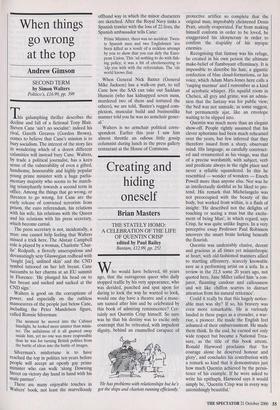Creating and hiding oneself
Brian Masters
THE STATELY HOMO: A CELEBRATION OF THE LIFE OF QUENTIN CRISP edited by Paul Bailey Bantam, £12.99, pp. 251 Who would have believed, 60 years ago, that the outrageous queer who daily stopped traffic by his very appearance, who was derided, punched and spat upon for daring to look the way he wanted to look, would one day have a theatre and a muse- um named after him and be celebrated by this book of admiring reminiscence? Cer- tainly not Quentin Crisp himself. So sure was he that his destiny was to excite only contempt that he retreated, with impudent dignity, behind an enamelled carapace of He has problems with relationships but he's got the ships and chariots running efficiently.' protective artifice so complete that the original man, improbably christened Denis Pratt, utterly evaporated. Far from making himself conform in order to be loved, he exaggerated his idosyncrasy in order to confirm the stupidity of his myopic enemies.
Recognising that fantasy was his refuge, he created in his own person the ultimate make-belief of flamboyant effeminacy. It is impossible to describe his hair, a gigantic confection of blue cloud-formations, or his voice, which Adam Mars-Jones here calls a `rasping murmur' and I remember as a kind of acrobatic whisper. His squalid room in Chelsea, all grey and grime, was an admis- sion that the fantasy was for public view; the bed was not unmade, as some suggest, but permanently ajar, like an envelope waiting to be slipped into.
Quentin was much more than an elegant show-off. People rightly assumed that his clever aphorisms had been much rehearsed over the years, but few inferred that they therefore issued from a sharp, observant mind. His language, as carefully construct- ed and ornamented as his visage, was that of a precise wordsmith, with subject, verb and predicate always in the right place and never a syllable squandered. In this he resembled — wonder of wonders — Enoch Powell more than anyone else. Nor was he as intellectually slothful as he liked to pre- tend. His remark that Michelangelo was not preoccupied with the beauty of the body, but worked from within, is a flash of insight: 'He described not the delights of touching or seeing a man but the excite- ment of being Man', in which regard, says Crisp, he was quite unlike Ingres. In a very perceptive essay Professor Paul Robinson uncovers the smart brain lurking beneath the flourish.
Quentin was undeniably elusive, decent and gracious at all times yet misanthropic at heart, with old-fashioned manners allied to startling effrontery, scarcely knowable save as a performing artist on a sofa. In a review in the TLS some 20 years ago, not quoted here, Jane Miller called him 'a con- juror, flaunting candour and callousness and wit like chiffon scarves to distract attention from his natural reticence'.
Could it really be that this hugely notice- able man was shy? If so, his bravery was even more remarkable. He is variously lauded in these pages as a crusader, a war- rior, a pioneer. He made the English feel ashamed of their embarrassment. He made them think. In the end, he earned not only wide respect but became a National Trea- sure, as the title of this book attests. Ronald Harwood proclaims that 'for courage alone he deserved honour and glory', and concludes his contribution with a remark so kind that it demonstrates just how much Quentin achieved by the persis- tence of his example. If he were asked to write his epithaph, Harwood says it would simply be, 'Quentin Crisp was in every way astonishingly beautiful.'

























































































 Previous page
Previous page